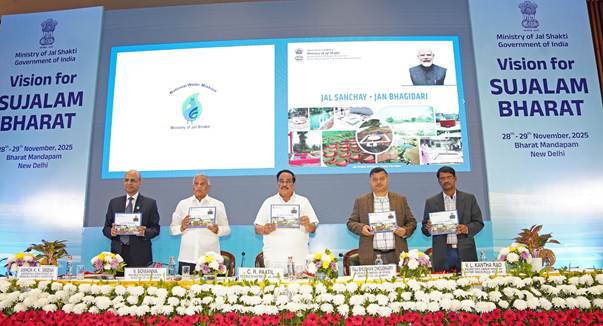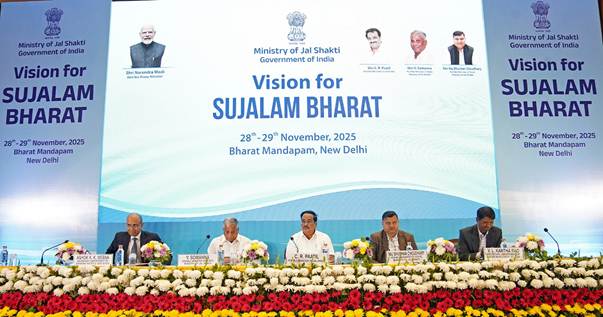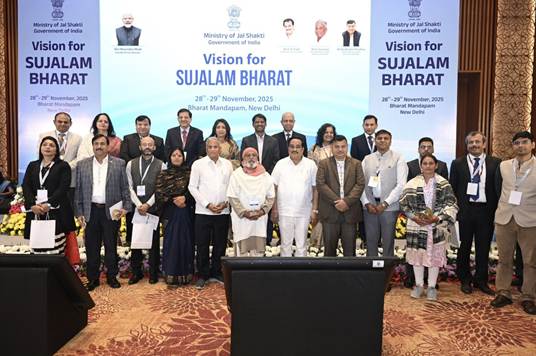Ministry of Jal Shakti
Jal Shakti Ministry’s Two-day Summit on “Vision for Sujalam Bharat” 2025 commences in New Delhi
Union Minister C.R. Paatil Highlights Sujalam Bharat as a Collective National Effort to Build Water-Secure and Empowered Communities
Summit Sets National Agenda for Water Security, Sustainability, and Community Participation
प्रविष्टि तिथि:
28 NOV 2025 4:45PM by PIB Delhi
The “Vision for Sujalam Bharat” Summit 2025, organised by the Ministry of Jal Shakti, commenced today at Bharat Mandapam, New Delhi, and will continue during 28–29 November 2025. The inauguration ceremony of the Summit witnessed the participation of about 250 attendees, including representatives from Central Ministries, States and Union Territories, technical experts, Panchayat members, NGOs, Self-Help Groups (SHGs), community organisations, and recipients of the National Water Awards and the Jal Sanchay Jan Bhagidari Awards.
The event started with the traditional ‘Jal Kalash’ ceremony.

Addressing the gathering, Union Minister of Jal Shakti, Shri C.R. Paatil, highlighted that, in line with the Prime Minister’s vision, the Sujalam Bharat Summit—led by the Ministry of Jal Shakti and closely coordinated with NITI Aayog—aims to bring grassroot perspectives into national decision-making, with a focus on strengthening water management, sanitation, and sustainable practices across the country. He emphasized that the Summit forms a vital part of a broader national effort to integrate scientific approaches, sustainable practices, and community participation into a unified framework for long-term water security.
He noted that with nearly 18% of the global population and only around 4% of freshwater resources, the country is facing challenges arising from rapid urbanization, industrial growth, shifting land-use patterns, and climate variability. He stated that the solution lies in the creation of water-conservation structures with active community participation.
Complementing the efforts of the Department, the Minister mentioned that large-scale water-conservation and recharge initiatives are ongoing through the Jal Shakti Abhiyan (JSA) and Jal Sanchay Jan Bhagidari (JSJB). He added that the Namami Gange Programme continues to restore river health across the Ganga basin, while the Jal Jeevan Mission (JJM) and Swachh Bharat Mission (SBM) reinforce these measures by improving drinking water access and sanitation outcomes.

As part of the inaugural session, the Union Minister of Jal Shakti released the Book on Jal Sanchay Jan Bhagidari 1.0, showcasing community-led groundwater recharge efforts and successful water conservation models from across the country. A Report on the Assessment of the Ecological Status of the Barak River Basin for Conservation Planning was also launched, providing critical scientific insights to guide basin-wide restoration strategies. In addition, the Ganga Pulse Public Portal was unveiled, offering an integrated digital platform to enhance public access to real-time information and promote wider participation in river health monitoring.

He further informed that the Modernization of the Command Area Development and Water Management (SAMRIDHI-MCAD) is enhancing irrigation efficiency through pressurized and scientific irrigation systems. He also highlighted that Jal Shakti Abhiyan: Catch the Rain (JSA:CTR 2025) has led to the creation of 22.5 lakh water-conservation works and more than 42 lakh plantation activities.
He urged that the Vision for Sujalam Bharat would guide India’s collective efforts in securing a sustainable water future, and expressed confidence that all stakeholders would share their insights, contribute their field experiences, and help refine a practical, forward-looking roadmap for a water-secure and climate-resilient India with active community participation.
He emphasized that the Summit should resolve to realize the Prime Minister’s vision of a Sujalam, Sustainable, and Prosperous Bharat for generations to come.
Minister of State, Shri V. Somanna, stated that the objective of the Summit is to strengthen India’s long-term water and sanitation security by bringing together grassroots insights, State experiences, and institutional perspectives within a unified national framework.

He stated that Sujalam Bharat is not merely a programme but a collective national endeavour to build water-secure, healthy, and empowered communities. He urged participants to share insights, highlight local innovations, and contribute meaningfully to refining the path ahead.
Minister of State, Shri Raj Bhushan Choudhary emphasised that water security is not only an environmental or economic issue—it is a matter of dignity, health, and social equity. He stated that when communities have assured access to clean water, it brings respect and empowerment, particularly for women who traditionally bear the burden of water collection. Reliable water supply, he noted, improves hygiene, reduces disease, supports livelihoods, enhances nutrition, and uplifts the overall quality of life. Access to water is access to opportunity—enabling children to attend school, farmers to diversify crops, and households to lead healthier, more dignified lives. He further stressed that community participation and traditional wisdom, in conjunction, would play a vital role in transforming India’s water systems.

A short film highlighting the objectives of the SAMRIDHI Yojana was also played during the session.
The summit covers thematic sessions on six core themes, namely:
(i) Rejuvenation of Rivers and Springs—ensuring Aviral (continuous) and Nirmal (clean) Dhara, spring-shed management, catchment protection, wetland restoration, riverfront development, and community-led river stewardship;
(ii) Sustainability of Drinking Water—ensuring adequate and safe drinking water through source-sustainability planning, climate-resilient infrastructure, community-based O&M, and digital governance tools;
(iii) Technology for Efficient Water Management—adoption of digital tools, AI-driven water monitoring, micro-irrigation, loss reduction, leak detection, and precision agriculture for demand-side water management;
(iv) Water Conservation and Recharge—community-led groundwater governance, managed aquifer recharge, revival of traditional systems, and LiFE-aligned behavioural interventions;
(v) Greywater Management and Reuse—promotion of circular water uses through financing models, pricing frameworks, nature-based solutions, septage management, and reuse in domestic, industrial, and urban sectors; and
(vi) Community & Institutional Engagement for Behaviour Change—strengthening community institutions, frontline workers, and inter-departmental convergence to ensure long-term sustainability of water assets.
Based on the feedback received from the participants, the Ministry will consolidate the key takeaways into a structured set of actionable recommendations, which will guide the next phase of implementation across the concerned departments and partner institutions.
***
ND
(रिलीज़ आईडी: 2195901)
आगंतुक पटल : 100
इस विज्ञप्ति को इन भाषाओं में पढ़ें:
Gujarati